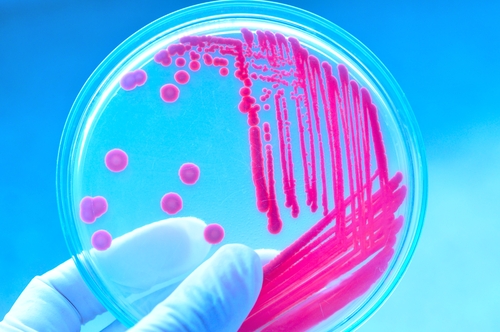Experimental Drug Shows Dramatic Improvement Against Bacterial Infection in CF Patients

 The rise in bacterial strains that are highly resistant to antibiotics is a growing health concern, as the research community scrambles to discover new alternatives to treating bacterial infections. This concern is particularly heightened in the cystic fibrosis community, where effective antibiotics are crucial in curtailing what could become deadly lung infections. Now, a new therapy based on engineered cationic antimicrobial peptides was shown to be more efficient than antibiotics when used against bacteria that have become drug-resistant. This study was performed by Dr. Ronald Montelaro, a professor and the co-director of the Center for Vaccine Research at the University of Pittsburgh, along with colleagues.
The rise in bacterial strains that are highly resistant to antibiotics is a growing health concern, as the research community scrambles to discover new alternatives to treating bacterial infections. This concern is particularly heightened in the cystic fibrosis community, where effective antibiotics are crucial in curtailing what could become deadly lung infections. Now, a new therapy based on engineered cationic antimicrobial peptides was shown to be more efficient than antibiotics when used against bacteria that have become drug-resistant. This study was performed by Dr. Ronald Montelaro, a professor and the co-director of the Center for Vaccine Research at the University of Pittsburgh, along with colleagues.
“Very few, if any, medical discoveries have had a larger impact on modern medicine than the discovery and development of antibiotics,” said Dr. Montelaro in a press release. “However, the success of these medical achievements is being threatened due to increasing frequency of antibiotic resistance. It is critical that we move forward with development of new defenses against the drug-resistant bacteria that threaten the lives of our most vulnerable patients,” added Dr. Montelaro.
In this study, the research team sought to determine if a possible alternative to traditional antibiotics known as “eCAPs” (engineered cationic antimicrobial peptides), are indeed effective in treating both gram-positive and negative bacteria as well as against several strains that are highly resistant to treatment. The authors compared two eCAPs, WR12 and WLBU2, with the LL37 antimicrobial peptide and colistin by testing them against 100 bacteria strains that were isolated from cystic fibrosis pediatric subjects who were diagnosed with chronic lung infections, as well as 42 other strains. In this study, the researchers worked with 32 gram-positive and 110 gram-negative clinical isolates. The research team found that LL37 and colistin separately stopped the growth of 51% of the bacterial samples, while eCAPs that stopped growth in 87% to 91% of the samples. Notably, the bacteria will develop resistance to these new cationic antimicrobial peptides with more difficultly compared to traditional antimicrobial treatments.
[adrotate group=”1″]
Dr. Montelaro was very surprised with the high antimicrobial activity of eCAPs when tested against the performance of traditional drugs, but notes that it will be important to assess how long eCAPs can remain effective against the bacteria before they eventually develop resistance.
The research team also tested eCAPs, LL37, colistin and rifampin against three Pseudomonas aeruginosa strains. The P. aeruginosa strains were found to be resistant to rifampin, LL37 and colistin, respectively, within the first 3, 9 and 13 days of exposure, but resistance to eCAPs did not appear until the first 25 to 30 days.
Dr. Montelaro said that this study showed that “the rationally designed engineered antimicrobial peptides has a wide window of activity against multi drug resistant ESKAPE microbes and are less vulnerable than common antibiotics in developing bacterial resistance. The current study demonstrates that rationally designed engineered antimicrobial peptides display broad spectrum activity against multi drug resistant ESKAPE pathogens and are less susceptible than standard antibiotics to the development of bacterial resistance.” Thus, “the engineered antimicrobial peptides represent a new strategy for development in the treatment of drug-resistant bacterial infections.”







